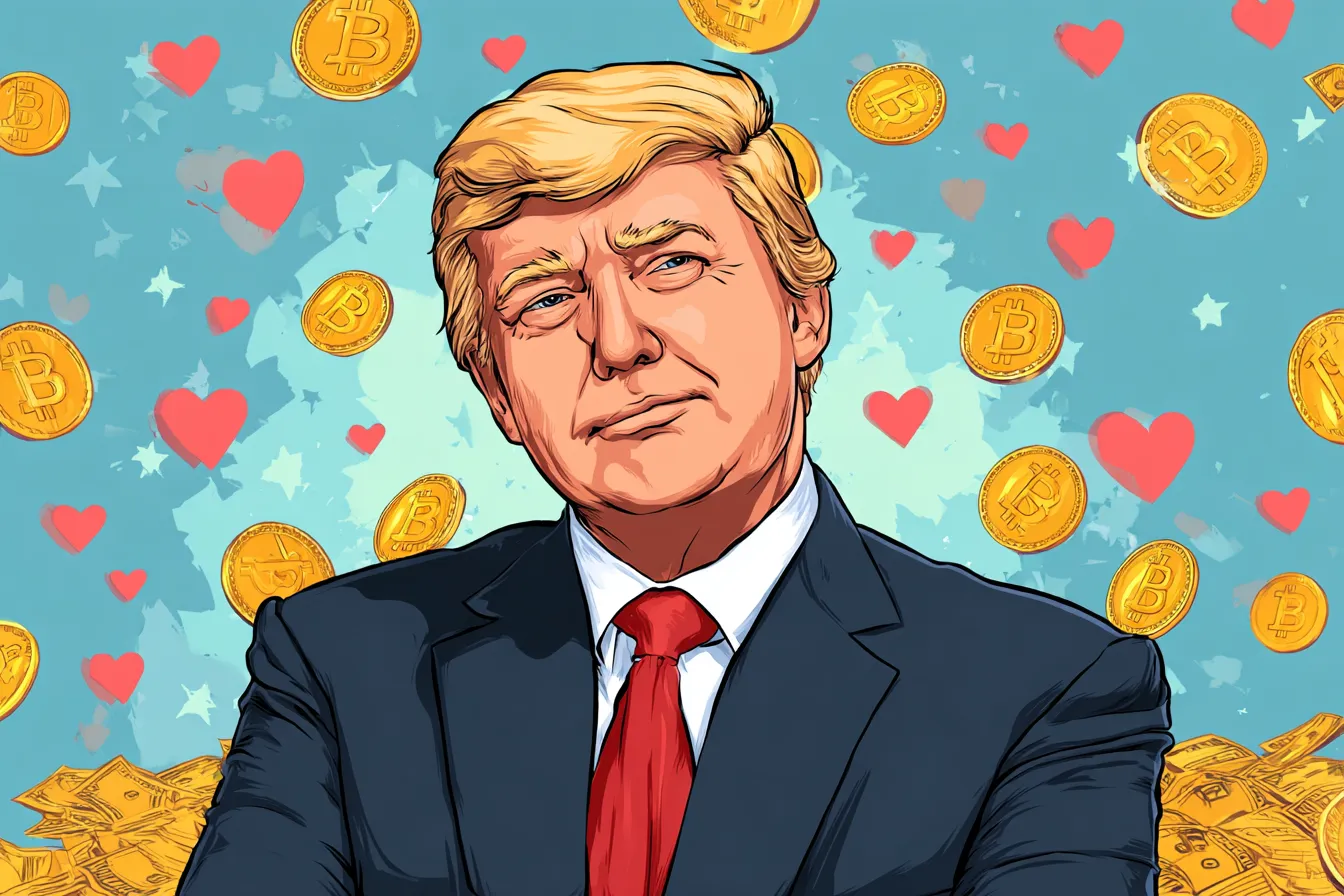
The United States is positioning itself to become the crypto capital of the world, with President Donald Trump reiterating his vision for American dominance in the digital assets and technology sectors, with a special focus on AI.
Yesterday, Trump made a bold pitch for American leadership in Bitcoin adoption and innovation at the America Business Forum in Miami, Florida.
He stressed that notable businesspeople involved in the crypto space and other fields provide credence to the idea that the digital asset market is a sizable industry.
Trump asserts that his administration has transformed the federal government's position on digital currencies, implementing numerous executive orders to legitimize them.
The president said, "We're making the United States the Bitcoin Superpower, the crypto capital of the world." He added, "Crypto was under siege. It’s not under siege anymore," and was very critical of the Biden administration's hard line on Bitcoin.
Gary Gensler, the former chair of the SEC, became notorious for his hard line on crypto as he launched a slew of enforcement actions against major exchanges, including Binance and Coinbase.
He stepped down as chair of the SEC on January 20 and was succeeded by crypto advocate Paul Atkins.
Bitcoin Easing Pressure on the Dollar?
Among the many advantages of Bitcoin, Trump mentioned how the asset assisted in easing the pressure on the dollar.
He said, "It takes a lot of the pressure off the dollar. It does a lot of good things, but we’re into it. Biden was vicious on crypto. They were going after these crypto guys. It was terrible."
Contrary to Trump's claims, this is not always the case. Bitcoin does not reliably alleviate pressure on the dollar; rather, its relationship is intricate and can exhibit contradictions.
Sometimes, a robust dollar can exert pressure on Bitcoin, while at other moments, the growing acceptance of crypto might alleviate some of that pressure on the dollar by providing an alternative to traditional currencies or by heightening volatility in the foreign exchange market.
There are perspectives suggesting that Bitcoin's role as a neutral alternative might strengthen the dollar's standing by safeguarding it against being undermined by other fiat currencies.
Those holding alternative currencies may feel the pinch as the value of Bitcoin takes a hit when the US dollar strengthens.
Bitcoin and other dollar-priced assets see their demand fall as the dollar rises in value, and cryptos lose some of their allure as a hedge against the downfall of fiat currencies.
That is similar to gold.
Research indicates that significant trading volumes and price fluctuations in Bitcoin can impact fiat currency markets, heightening volatility in the dollar.
This happens when market participants refine their approaches and navigate potential risks.
When contrasted with more conventional assets like the dollar, Bitcoin's price fluctuations are affected by a diverse set of variables, suggesting a degree of resilience that could be useful in some contexts.
As a result of current market circumstances, the dynamics can shift. Coinciding with an increase in the value of the dollar, we saw a fall in Bitcoin and stock prices recently.
However, Bitcoin and gold have both risen sharply during periods of increased worry about global debt or the dollar's decline, demonstrating their role as alternative assets in a "debasement trade" bet.
In contrast to fiat currencies used in daily transactions or international trade, Bitcoin is more akin to a "digital gold" as a store of value or a speculative commodity.
An appealing hedge against the possible debasement of fiat currencies, which central banks can print endlessly, is their limited supply, which is capped at 21 million coins.
Trump's Crypto Embrace is Real
Trump has also put his money where his mouth is after advocating for cryptos.
The administration has taken many noteworthy steps this year, including creating a US Digital Asset Stockpile and a Strategic Bitcoin Reserve.
Legislation pertaining to market structure is still in the works, but stablecoin regulation was ushered in by the GENIUS Act in July.
David Sacks, the White House AI and crypto czar, recently provided an update regarding the progress of the CLARITY Act, which has faced several challenges.
Before the Senate Agriculture Committee meeting, Sacks, in a post on X, said that he had a productive conversation with Senators John Boozman and Cory Booker about legislation pertaining to the structure of the bitcoin market.
He is optimistic about the progress made and plans to collaborate soon on a draft.
Thank you Chairman @JohnBoozman & Senator @CoryBooker @SenBooker for a constructive discussion today about the crypto market structure legislation before Senate Ag Committee. I am encouraged by the great progress so far, and look forward to a bipartisan draft in the near future.
— David Sacks (@davidsacks47) November 6, 2025
Crypto Industry Under Trump 2.0
If current trends continue, the US will overtake India as the world's most-adopted Bitcoin market this year.
Benefits accrued to North America as a result of well-defined laws, including the support of spot Bitcoin ETFs and the formation of more structured institutional frameworks.
There has been a surge of institutional interest in stablecoin operations due to the GENIUS Act.
The recent electoral outcomes for the Trump administration have prompted questions regarding the future trajectory of its cryptocurrency policy initiatives.
Nonetheless, Trump's bold initiatives and the advancements made by the US in the crypto sector underscore the commitment to establishing the nation as a frontrunner in digital assets.
After Trump's Crypto Love, Hedge Funds Dive In
Even as mainstream hedge funds were hesitant to invest in cryptos for a long time, Trump's friendly attitude is now luring them in.
Bull markets have failed to do this before.
According to a recent survey by PwC and the Alternative Investment Management Association, the percentage of traditional hedge funds that have crypto holdings rose to 55% in 2025 from 47% last year.
In spite of the constant volatility and uncertainty in the cryptocurrency markets, a significant 47% of institutional investors have stated that the current regulatory climate has encouraged them to increase their holdings in this asset class.
Recent events, such as the nomination of pro-digital currency agency heads and the passage of the GENIUS Act, which institutes new rules for stablecoins, have had a significant impact on this sentiment.
The poll was conducted in the first half of 2025 and gathered responses from 122 global hedge funds and institutional investors who were responsible for approximately $1 trillion in assets.
Certainly, it's not just regulations that are drawing in more discerning investors.
There is a prevailing anxiety about losing out on significant profits (FOMO), even if it entails navigating through the intense fluctuations that have affected digital currencies recently.
What remains to be seen is whether Trump could manage to really boost America's dominance in the sector even further with his policies.
Elsewhere
Podcast
Licensed to Shill VII: Token Listings, Market Makers & Regulation, ft. Gracie Lin (CEO, OKX Singapore)
This episode of Blockcast's Licensed to Shill features Gracie Lin, OKX Singapore CEO, alongside usual panelists Nikhil Joshi, Lisa JY Tan and host Takatoshi Shibayama, who revisit the contentious topic of token listing practices on exchanges. The conversation covers the evolving roles of centralized (CEX) and decentralized (DEX) exchanges, with Lin highlighting that regulatory clarity will ultimately guide the industry's structure.
Like what you hear? Subscribe to Blockcast on Spotify , Apple Podcasts , or wherever you listen.
We're a media partner for the upcoming Singapore Fintech Festival! Use the promo code SFFSMPBH for 20% off all delegate passes at this link !
Blockhead is a media partner for Consensus Hong Kong 2026. Readers can save 20% on tickets using exclusive code BLOCKDESK at this link .





